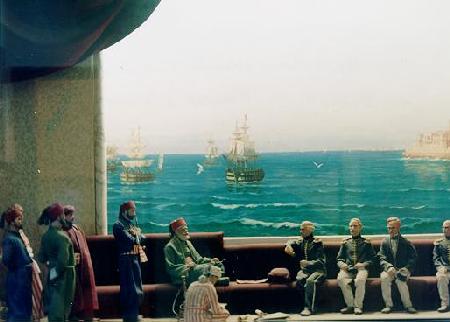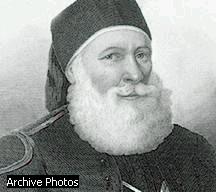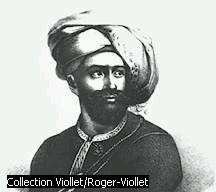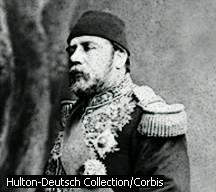Egyptian Rulers 1800-1900
Mohamed Ali Pasha I
b. 1769, Kavala, Macedonia, Ottoman Empire [now in Greece]d. Aug. 2,
1849, Alexandria
 Viceroy and pasha
of Egypt (1805-49), founder of the dynasty that ruled Egypt from the beginning
of the 19th century to the middle of the 20th. He encouraged the emergence
of the modern Egyptian state.
Viceroy and pasha
of Egypt (1805-49), founder of the dynasty that ruled Egypt from the beginning
of the 19th century to the middle of the 20th. He encouraged the emergence
of the modern Egyptian state.
Rise to power.
Muhammad 'Ali's ethnic background is unknown, though he may have been
an Albanian and was certainly a Muslim and an Ottoman subject. His father,
Ibrahim Agha, the commander of a small provincial military force that was
maintained by the governor of Kavala, died when Muhammad 'Ali was a boy,
and he was brought up by the governor. At 18 he was married to one of the
governor's relatives, who became the mother of five of Muhammad 'Ali's
95 children. He became involved in the tobacco trade, an experience that
may account for his later commercial interests.
In 1798 Egypt, at that time a semi-autonomous province of the Ottoman
Empire, was occupied by a French force under Napoleon Bonaparte. Muhammad
'Ali went there as part of an Ottoman expeditionary force to oppose the
French. With great political skill, he managed by 1805 to be named the
wali, the Ottoman sultan's viceroy in Egypt, with the rank of pasha.
 Nowhere in the
Ottoman Empire was there greater opportunity for a total restructuring
of society than in Egypt. The three-year French occupation (1798-1801)
had disrupted the country's traditional political and economic structure.
Continuing the task begun by the French, Muhammad 'Ali put an end to Egypt's
traditional society. He eliminated the Mamluks, the former ruling oligarchy,
expropriated the old landholding classes, turned the religious class into
pensioners of the government, restricted the activities of the native merchant
and artisan groups, neutralized the Bedouins, and crushed all movements
of rebellion among the peasants. The task of rebuilding Egypt along modern
lines now lay before him.
Nowhere in the
Ottoman Empire was there greater opportunity for a total restructuring
of society than in Egypt. The three-year French occupation (1798-1801)
had disrupted the country's traditional political and economic structure.
Continuing the task begun by the French, Muhammad 'Ali put an end to Egypt's
traditional society. He eliminated the Mamluks, the former ruling oligarchy,
expropriated the old landholding classes, turned the religious class into
pensioners of the government, restricted the activities of the native merchant
and artisan groups, neutralized the Bedouins, and crushed all movements
of rebellion among the peasants. The task of rebuilding Egypt along modern
lines now lay before him.
But, though Muhammad 'Ali had considerable native intelligence and
great personal charm, he was a man of limited knowledge and of narrow horizons.
He proved insensitive to the possibilities open to him and governed generally
according to Ottoman principles. No group within Egyptian society was capable
of forcing fundamental changes upon him; elements that might have served
as the instruments of change had been crushed at the outset of his regime.
Neither was there an ideology capable of bringing together the ruler and
the ruled in a great national effort. Finally, Muhammad 'Ali had to devote
much of his effort to resisting attempts by his Ottoman overlord to remove
him from office. His policies were designed more to entrench himself and
his family in Egypt as its hereditary rulers than to create a new society.
** Copyright © 1994-2000 Encyclopædia Britannica, Inc.
* Pic.:Mohamed Ali Pasha receiving Envoys and Ambassadors of Europe
at Alexanderia
Mohamed Ali Pasha II
 Muhammad Ali
(1769-1849), also Mehemet Ali, Ottoman pasha (or viceroy) of Egypt (1805-1849),
who reformed the country and founded a dynasty that ruled it until the
mid-20th century.
Muhammad Ali
(1769-1849), also Mehemet Ali, Ottoman pasha (or viceroy) of Egypt (1805-1849),
who reformed the country and founded a dynasty that ruled it until the
mid-20th century.
Muhammad Ali was probably born in Kavála (now in eastern
Macedonia, Greece) of Albanian parentage. From 1799 to 1801 he fought in
several battles in Egypt, then part of the Ottoman Empire, against the
French forces led by Napoleon I. In 1805 Muhammad Ali was appointed viceroy
of Egypt, with the title of pasha. He defeated an invading British army
in 1807; four years later he ensured his supremacy in Egypt by massacring
the Mamelukes, a military group that had conspired to usurp his power.
He modernized Egypt's governmental administration and military forces and
in 1811 launched a war against the Wahhabis of Arabia; the war was won
in 1818 by his son, Ibrahim Pasha. From 1820 to 1822 Muhammad Ali was engaged
in the conquest of the Sudan, and shortly thereafter, in 1823, he founded
the city of Khartoum. In 1824 the Ottoman sultan, Mahmud II, called on
him for aid in the war against the Greek rebels. His successes in the ensuing
campaigns prompted the sultan to award him the island of Crete.
In 1827, Great Britain, France, and Russia found it necessary
to protect their interests in the Mediterranean by shattering Ibrahim Pasha's
fleet at Navarino (now Pilos), on the west Peloponnesian coast of Greece,
thereby preventing Muhammad Ali from pressing his victories over the Greeks.
In 1831 Muhammad Ali invaded Syria after Mahmud refused to make him governor
there. His victory in this war resulted in the extension of his dominions
to the Persian Gulf. In 1839 war again broke out with the sultan; Muhammad
Ali was again victorious, but as before was deprived of the fruits of victory
by the European powers of Great Britain, Russia Austria, and Prussia. He
was, however, granted the right to pass his power to his descendants, who
ruled Egypt until the overthrow of King Faruk I in 1952. Muhammad Ali died
in Alexandria, Egypt, on August 2, 1849.
"Muhammad Ali (1769-1849)," Microsoft® Encarta® Encyclopedia
2000. © 1993-1999 Microsoft Corporation. All rights reserved.
 Ibrahim
Pasha :Son of Muhammad Ali, Ottoman pasha of Egypt, Ibrahim Pasha
fought in many Ottoman wars, including a notorious campaign in Greece in
the 1820s which led to intervention by the European Great Powers. He later
fought for his father against the Ottoman sultanate. Ibrahim inherited
his father's position in 1848, but died within the year.
Ibrahim
Pasha :Son of Muhammad Ali, Ottoman pasha of Egypt, Ibrahim Pasha
fought in many Ottoman wars, including a notorious campaign in Greece in
the 1820s which led to intervention by the European Great Powers. He later
fought for his father against the Ottoman sultanate. Ibrahim inherited
his father's position in 1848, but died within the year.
Collection Viollet/Roger-Viollet
 "Ibrahim Pasha,"
Microsoft® Encarta® Encyclopedia 2000. © 1993-1999 Microsoft
Corporation. All rights reserved.
"Ibrahim Pasha,"
Microsoft® Encarta® Encyclopedia 2000. © 1993-1999 Microsoft
Corporation. All rights reserved.
Ibrahim Pasha (1789-1848), Egyptian general and viceroy, born in Kavála,
eastern Macedonia, Greece, the son or adopted son of Muhammad Ali, who
became the Turkish-appointed viceroy of Egypt. Ibrahim commanded the Egyptian
troops in Arabia in their successful campaign against the Wahhabi tribesmen
(1816-1818). In 1824, during the war for Greek independence from Turkey,
he was sent to the Peloponnese (Greece) with a squadron and an army of
17,000 men to quell the rebellion. With superior forces and artillery,
he was victorious in the field but was harassed by Greek guerrilla forces
after the siege of Missolonghi (1824). In revenge, he devastated the country
and deported and enslaved thousands of Greeks. Great Britain, Russia, and
France intervened and compelled the Egyptian force to withdraw in 1828.
In 1831, when his father revoked his allegiance to the sultan
of the Ottoman Empire, Ibrahim invaded Syria, then under Ottoman rule.
He defeated the Turks in several battles and became governor of Syria.
The conflict was resumed from 1838 to 1839 and culminated in Egyptian victory.
Great Britain, Russia, Austria, and Prussia, however, forced Ibrahim Pasha
to abandon Syria in 1841. He replaced his father as viceroy of Egypt in
1848, but died shortly afterwards.
"Ibrahim Pasha," Microsoft® Encarta® Encyclopedia 2000. ©
1993-1999 Microsoft Corporation. All rights reserved.
Abbas I
Abbas I (of Egypt) (1813-1854), pasha of Egypt (1849-1854), grandson
of the pasha Muhammad Ali. His full name was Abbas Hilmi. In 1848, on the
death of his uncle Ibrahim Pasha, Abbas became regent of Egypt for the
Ottoman Empire. He was created pasha in the following year. Most of the
domestic reforms accomplished by Muhammad Ali were undone during the reign
of Abbas, who opposed the Suez Canal project, though he allowed the British
to build the Alexandria-Cairo Railway. In general he distrusted Europeans
and European-inspired reforms. Finally he was murdered by his slaves.
"Abbas I (of Egypt)," Microsoft® Encarta® Encyclopedia 2000.
© 1993-1999 Microsoft Corporation. All rights reserved.
Abbas II
Abbas II (1874-1944), last khedive (Turkish viceroy) of Egypt. His full
name was Abbas Hilmi Pasha. He succeeded his father Muhammad Tawfik Pasha
to the throne of Egypt in 1892. During the early years of his reign he
opposed British interference in Egyptian affairs. After 1900, however,
he was compelled to cooperate with progressive measures instituted by the
British resident at Cairo. During his reign Egypt reconquered the Sudan
(1898) and the railway to Khartoum, Sudan, was completed (1899), as was
the first Aswân Dam (1902). Abbas II supported the Ottoman Turks
in World War I and was deposed in 1914, when Great Britain established
a protectorate over Egypt. He spent the rest of his life in exile.
"Abbas II," Microsoft® Encarta® Encyclopedia 2000. © 1993-1999
Microsoft Corporation. All rights reserved.
 Ismail
Pasha (1830-1895), khedive of Egypt, second son of Ibrahim Pasha,
born in Cairo, and educated in Paris. He succeeded his uncle, Said Pasha,
as viceroy of Egypt in 1863. Four years later the sultan of the Ottoman
Empire granted him the title of khedive, with the right to pass the title
to his son. Ismail thereupon embarked on an extensive programme of public
works and administrative and social reforms. He also promoted the construction
of the Suez Canal (1859-1869), which connects the Mediterranean Sea with
the Gulf of Suez. As a result of his administrative policies, however,
the government debt had risen over thirtyfold between 1863 and 1874. Eventually,
as the government's financial situation worsened, and France and Great
Britain realized the strategic importance of Egypt, they assumed control
of Egyptian finances. Ismail was compelled to abdicate in favour of his
son Muhammad Tawfik Pasha in 1879 and subsequently lived in exile abroad.
He died at his palace near Constantinople (now Ýstanbul, Turkey).
Ismail
Pasha (1830-1895), khedive of Egypt, second son of Ibrahim Pasha,
born in Cairo, and educated in Paris. He succeeded his uncle, Said Pasha,
as viceroy of Egypt in 1863. Four years later the sultan of the Ottoman
Empire granted him the title of khedive, with the right to pass the title
to his son. Ismail thereupon embarked on an extensive programme of public
works and administrative and social reforms. He also promoted the construction
of the Suez Canal (1859-1869), which connects the Mediterranean Sea with
the Gulf of Suez. As a result of his administrative policies, however,
the government debt had risen over thirtyfold between 1863 and 1874. Eventually,
as the government's financial situation worsened, and France and Great
Britain realized the strategic importance of Egypt, they assumed control
of Egyptian finances. Ismail was compelled to abdicate in favour of his
son Muhammad Tawfik Pasha in 1879 and subsequently lived in exile abroad.
He died at his palace near Constantinople (now Ýstanbul, Turkey).
"Ismail Pasha," Microsoft® Encarta® Encyclopedia 2000. © 1993-1999
Microsoft Corporation. All rights reserved.
**Khedive, hereditary title granted in 1867 to the viceroy of Egypt,
Ismail Pasha, by the Ottoman sultan when Egypt was under the rule of the
Ottoman Empire. It was abolished in 1914 when Egypt became a British protectorate.
"Khedive," Microsoft® Encarta® Encyclopedia 2000. © 1993-1999
Microsoft Corporation. All rights reserved.
 Viceroy and pasha
of Egypt (1805-49), founder of the dynasty that ruled Egypt from the beginning
of the 19th century to the middle of the 20th. He encouraged the emergence
of the modern Egyptian state.
Viceroy and pasha
of Egypt (1805-49), founder of the dynasty that ruled Egypt from the beginning
of the 19th century to the middle of the 20th. He encouraged the emergence
of the modern Egyptian state.
 Nowhere in the
Ottoman Empire was there greater opportunity for a total restructuring
of society than in Egypt. The three-year French occupation (1798-1801)
had disrupted the country's traditional political and economic structure.
Continuing the task begun by the French, Muhammad 'Ali put an end to Egypt's
traditional society. He eliminated the Mamluks, the former ruling oligarchy,
expropriated the old landholding classes, turned the religious class into
pensioners of the government, restricted the activities of the native merchant
and artisan groups, neutralized the Bedouins, and crushed all movements
of rebellion among the peasants. The task of rebuilding Egypt along modern
lines now lay before him.
Nowhere in the
Ottoman Empire was there greater opportunity for a total restructuring
of society than in Egypt. The three-year French occupation (1798-1801)
had disrupted the country's traditional political and economic structure.
Continuing the task begun by the French, Muhammad 'Ali put an end to Egypt's
traditional society. He eliminated the Mamluks, the former ruling oligarchy,
expropriated the old landholding classes, turned the religious class into
pensioners of the government, restricted the activities of the native merchant
and artisan groups, neutralized the Bedouins, and crushed all movements
of rebellion among the peasants. The task of rebuilding Egypt along modern
lines now lay before him.
 "Ibrahim Pasha,"
Microsoft® Encarta® Encyclopedia 2000. © 1993-1999 Microsoft
Corporation. All rights reserved.
"Ibrahim Pasha,"
Microsoft® Encarta® Encyclopedia 2000. © 1993-1999 Microsoft
Corporation. All rights reserved.